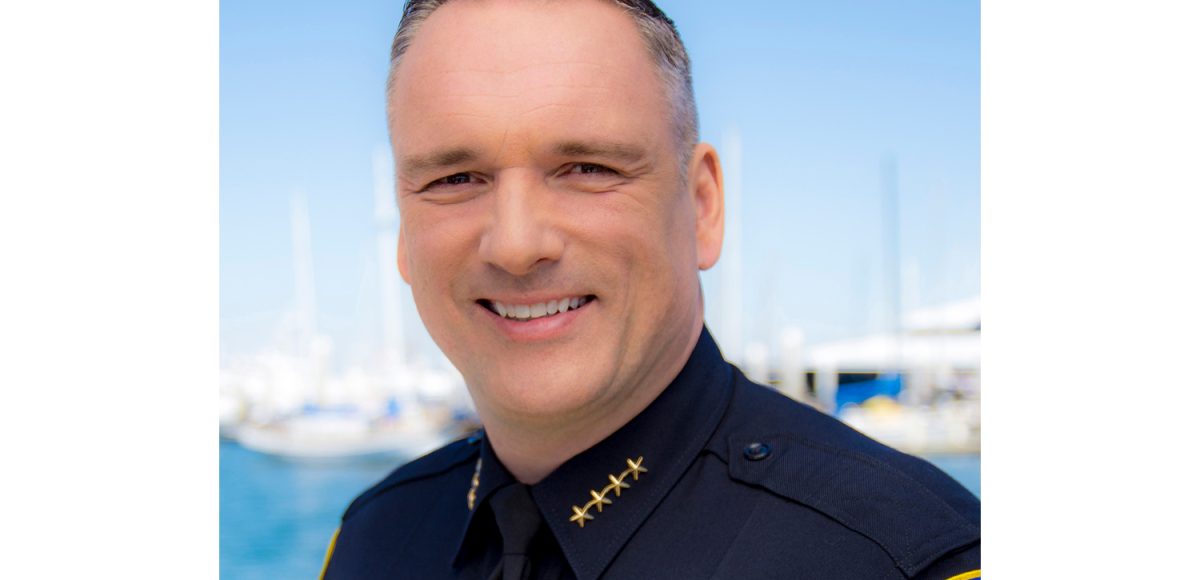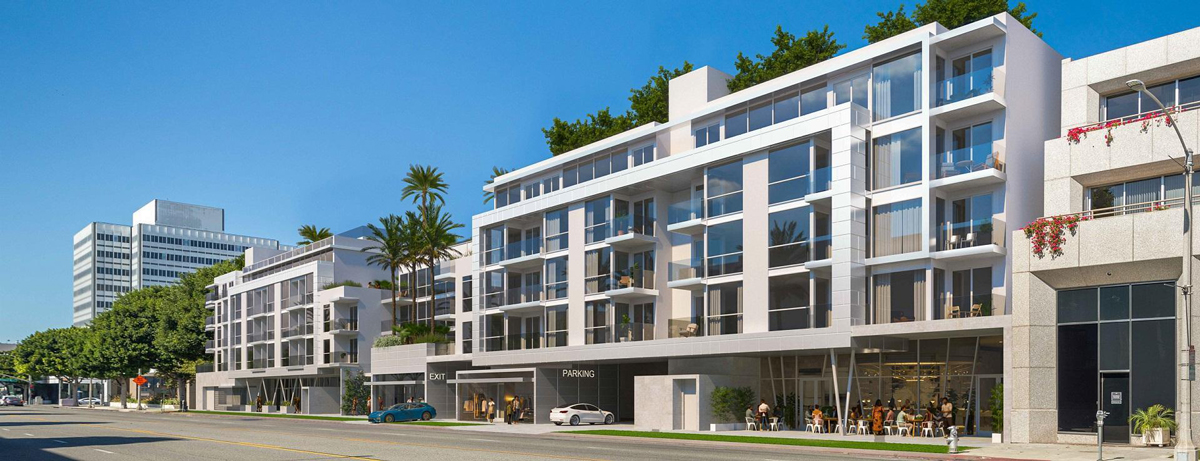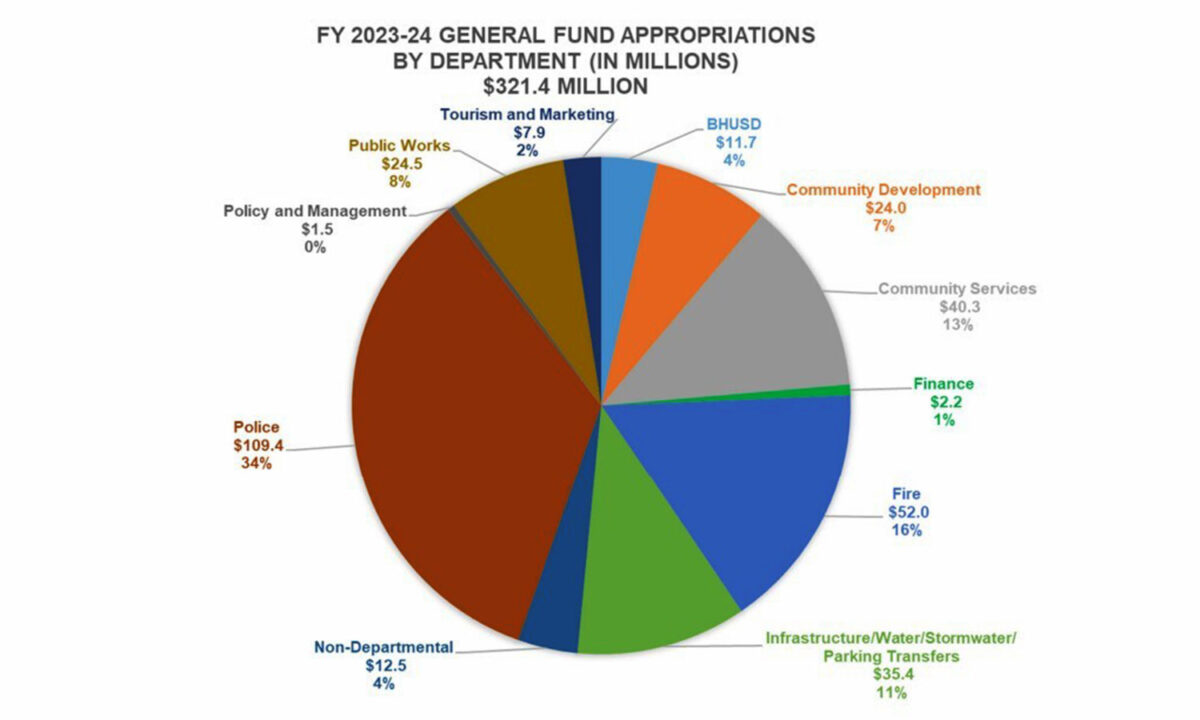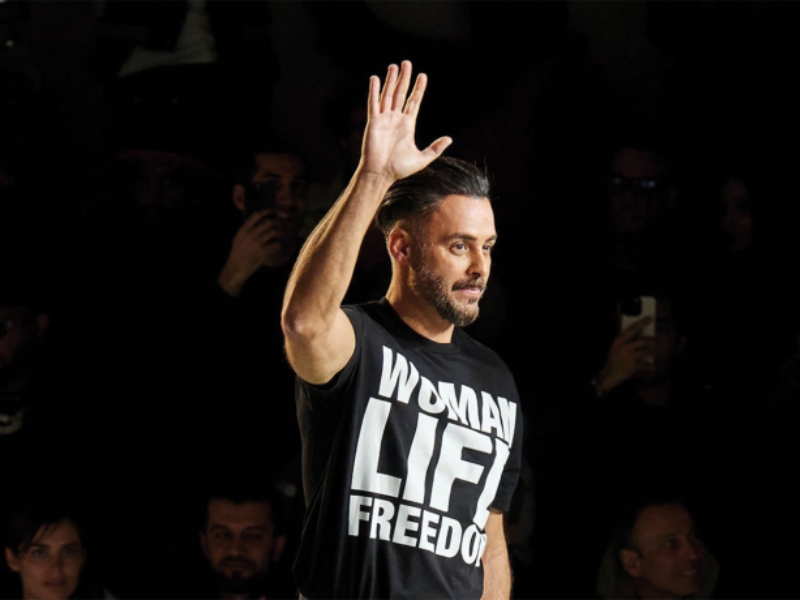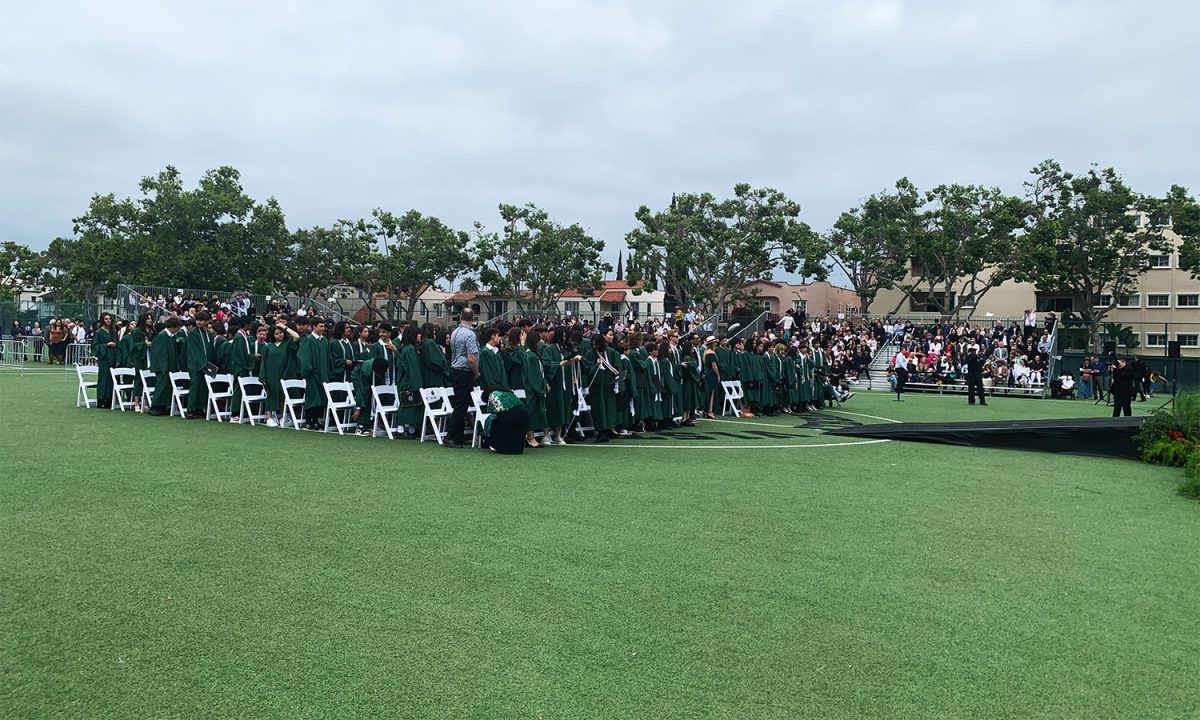After more than a year without a permanent Police Chief, the city of Beverly Hills has announced the appointment of Mark Stainbrook to fill that role. Stainbrook most recently served as the Chief of Police and Vice President of Public Safety for the Port of San Diego. In that role, he oversaw 146 sworn and 32 non-sworn staff with jurisdiction over the San Diego Bay, the San Diego International Airport, and the Tidelands around the Bay. He takes the helm of the Beverly Hills Police Department (BHPD) from Interim Chief Dominick Rivetti, who has served since the departure of Sandra Spagnoli in April 2020.
“I am thrilled to welcome Mark to Beverly Hills,” City Manager George Chavez said in a statement. “His international credentials, experience in high-profile agencies and collaborative approach will bring new energy and valuable insight to our community and the department.”
Stainbrook has a lengthy background in both law enforcement and the armed services. He enlisted in the Navy at 17 before switching shortly thereafter to the Marines. (He told the Courier he was bad at math.) He served in the United States Marine Corps Reserve for 32 years before retiring recently at the rank of Lieutenant Colonel. Before his time in San Diego, he worked for the Los Angeles Police Department (LAPD) beginning in 1995. He served in a variety of units there, including Community Resources Against Street Hoodlums (CRASH), gang, internal affairs and counterterrorism.
Stainbrook is expected to assume leadership of the BHPD in late November, according to the city. In this exclusive interview, Stainbrook spoke to the Courier about his background, his leadership philosophy and his hopes for the future of the BHPD.
BHC: What influenced you to go into the military and law enforcement?
Stainbrook: My dad was in the Navy for 42 years, so looking at him as I was growing up, all I really wanted to do was be in the military. I never wanted to be a police officer. I went to a military college in Vermont called Norwich and I enlisted in the Navy at 17 to pursue a military career. I got into an officer program when I was in college and switched to the Marines.
I was busing tables my sophomore year and some state troopers walked in and asked for directions. They said [they were] hiring auxiliary troopers to work boats and work snowmobiles in the winter. I said, ‘you pay for that? That sounds a lot better than busing tables.’ So, I started as a reserve officer in Vermont and worked for three different departments and just fell in love with law enforcement.
BHC: Jumping a little bit ahead in your life, what prompted you to write your master’s thesis, “Attitudes of American-Muslims towards Law Enforcement: A Comparison of before and after September 11, 2001?”
My dad was in the Pentagon when it got hit on September 11. I was working LAPD CRASH in West L.A. at the time. I woke up in the morning and saw that the buildings were burning and then I looked down to the righthand corner [of the TV] and they had the Pentagon, which was on fire. I was with my wife and I said, ‘oh my God, my dad works there.’ I didn’t know all day whether he was alive or dead. He was a PIO for the Navy and he briefed the admiral who briefed Rumsfeld every day. He’d be in really early in the morning, so I knew he’d be there.
He got out alive. He got smoke inhalation. He was one room in and to the right of where the plane hit. I call him every September 11 and tell him I don’t forget.
The next month, I left for Kosovo and I took a 10 Marine civil affairs team. Kosovo is 80% Muslim and I worked in an area called trpce, which was 40% Albanian Muslim and 60% Serbian. Our job was community policing of the Marine Corps [and] the military. We were out working with civilians all the time and the Muslim community loved us. I was like, wait a second, I’m confused. Muslims attacked the country, but they love us here. So, I really started studying the issues. I came right back and then I got deployed in Iraq for ground combat. There, I was working with Shia in the south, I was working with Sunni around Baghdad–completely different types of Muslim communities than I experienced in the Europeanized, Albanian Muslim community.
It fascinated me, this world ummah [Arabic for “community”] of the Muslim community. When I got back, I worked with LAPD and I was very interested in how the different Muslim communities around L.A. felt about police officers post-9/11. So that’s what I did my master’s thesis on.
I ended up getting a Fulbright Fellowship at Leeds university and studying the Muslim diaspora in Europe at the Theoloy and Religious Studies department. When I came back, I joined the counter-terrorism unit in LAPD and forming the first community outreach unit that specifically dealt with terrorism.
What the experience told me, too, was when you talk about community policing, whenever you typically meet an officer, it’s not in a good situation. I personally have had bad interactions with police officers and I am a police officer. So, what you want to try to do is set up as many non-conflictual engagements [with the public] and get to know each other on a more personal level. Because cops are just humans. We make mistakes, we have bad days, we don’t know everything.
BHC: In Iraq, during Operation Iraqi Freedom, you were tasked with setting up the Baghdad police in one sector and starting joint patrols with Marines. You were given no additional direction and only two Marines, who were also LAPD officers. Can you talk about the challenges you faced in reconstituting a working police force in a war-torn country?
That takes me back some 18 years ago now. All basic services were gone–electricity, water, looting everywhere, sniper fire, sporadic fighting still going on. We had nothing to work with. We were trying to get as many former police that, in one sense, we were just fighting three days earlier. We ended up getting thousands coming in and tried to organize them into some sort of working unit. It was very difficult. A lot of police cars and fire trucks had been stolen. So, one of our first jobs was just setting up checkpoints and trying to get vehicles back and just trying to get some semblance of order back.
It was there where the realization struck me that cops are cops wherever you go. These officers there, they just wanted to see their city return back to a normal, safe environment. A lot of the prisoners had been released or escaped from prisons and jails and police stations had been looted. I found a lot of commonality with Iraqi police. We did joint patrols with them while we were there. And so, then I transitioned to Southern Iraq and tried to help set it up on a broader, regional scale.
BHC: In your account of this time, you repeatedly refer to certain individuals, both American and Iraqi, as “good cops.” The term seems to carry special weight for you. In this context and beyond, what is a good cop to you?
I think it goes back to servant leadership, somebody that puts others ahead of themselves. When you want to serve others more than your own self-interests, I think that’s the basis of what makes a good cop. I was going through doors with Iraqis that we had just been fighting a couple of days before because they were cops and I was a cop. We went side by side into some dangerous situations.
BHC: To put a cap on your military service, you’ve received multiple military commendations, including the Navy-Marine Corps Medal for heroism, as well as the Army Commendation Medal and the Navy Achievement Medal. Could you give us the backstory?
The highest one is the Navy Marine Corps Medal for heroism. In ’92, there was 11 days of rain, which we probably need right now. The Base Camp Pendleton has the Santa Margarita river flowing through it. It was a major river and dried up over the last hundred years. But after all that rain, just a wall of water came washing down the basin. It destroyed the airfield. It was a massive flood and me and some of my MPs, we went in and rescued a bunch of people out of water.
BHC: What did that involve?
To effect one rescue, we got caught in a chlorine gas leak. We had to take a big truck and essentially navigate through five, six feet of water to get people stranded in different places. You had sinkholes, massive flooding, people trapped. I rescued some Marines using a bucket of a bulldozer. They were trapped, holding onto the top of vehicles and telephone poles at night. We pulled out six people.
BHC: Had you ever operated a bulldozer before?
No, but I had a corporal who was from a bad part of town that could pretty much operate any vehicle. He did a couple of old tricks to get it started. I was actually told by the Commandant of the Marine Corp after we potentially misappropriated a vehicle that it was good initiative, poor judgement. But we were trying to get people out of a flood.
BHC: Tell us about your experience with LAPD.
It was really interesting. I’m a farm boy from Maryland, so it was kind of like, wow. Being in the big city was kind of eye opening. I was the class leader in my academy class and the honor graduate in my academy class, so I got to pick where I wanted to go and I thought, I’m in L.A., I want to go to Hollywood, because Hollywood has a little bit of everything.
BHC: You wrote in a column entitled “What Didn’t They Teach Me In The Academy” that at times there can be a great deal of pressure on young officers to succumb to the ‘group think’ mentality. Is this something you’ve experienced personally and can you speak about that?
So, I think one of the things that shaped me…when I was a gang officer, my partner had a kickback in his department from some dope that wasn’t returned to court. He looks at it and he goes, ‘This isn’t mine. I don’t know what this is.’ It turned out that Rafael Perez had used his name and essentially stole the dope, which kind of started the whole Rampart scandal.
It was very eye opening to be where that thing got rolling. Then, later on, I was at internal affairs and I worked the Special Operations Division, which looked at officers who were potentially corrupt or doing bad things. It just makes you realize that there are people in any industry, in any organization that could be bad apples. You have to make sure that everybody is not having group think and just going along with everything. It’s okay to question some things and if something’s not right, say something about it.
BHC: Over the years, you’ve repeatedly written on the subject of leadership. Coming into a new department and city, in the most concrete terms possible, what will it mean to be a good leader?
That’s pretty easy for me. The first question I ask myself every day is, ‘what have you done for your people today?’ When you become a leader, it’s no longer about you. It’s about other people. I’ve done all the things I’ve wanted to do in my career. I’ve had a great career. My joy now is seeing other people succeed. I typically go around when I go to a new organization and I ask two things: ‘Are you getting what you need to succeed and how can I help you?’
BHC: Do you read much in your off time?
I read constantly. Right now, I’m reading “Range,” by David Epstein. It’s about how generalists outperform specialists and how specialized our society is getting. I’m usually reading multiple books at one time. A lot of biographies.
BHC: What’s a biography that’s stuck with you?
Ron Chernow’s “Washington: A Life,” because Washington didn’t really want to be a public servant, but he realized it was his fate to be one.
I’ll tell you what we do at my department. The command staff, we all read a book together. It’s a shared experience and it puts us in the same frame of mind. The first book we did when I was chief was “The Culture Code,” by Daniel Coyle–which is, by the way, the book we’ll be reading together at Beverly Hills when I get there. It talks a lot about how to build positive cultures within organizations. [Reading together] helps develop relationships, helps bring out how people really think about deep issues in a non-conflictual way.
BHC: Speaking of Beverly Hills, have you spent much time in the city before?
I was in LAPD for 17 years. I worked in the West L.A. division for five years. You can see similarities between Beverly Hills and West L.A. in terms of the community and some of the issues. [In Beverly Hills], I was able to go on a ride along and talk to some people and come up for my interviews, but I definitely am looking forward to spending a lot more time learning about the community and the city and the department and just getting down in the weeds.
BHC: You’re stepping into a department that has faced controversy for the last several years. The city has paid out millions in judgments and settlements stemming from allegations of misconduct by the former chief. The department is currently facing a proposed class action lawsuit for racial discrimination. How do you propose to right the ship?
Having new leadership means a fresh start. I literally don’t know anyone at the department. So, everybody there has a fresh start with me and I hope that leads to fresh starts with their internal relationships with each other and building bridges with each other and with the community. I don’t really focus on the past too much. A leader, as the term conveys, is about going into a bright future. And there’s no doubt to me that it’s a good department, it’s a great city and there’s a bright future there. It’s been a tough time for every officer in the state, every officer in the country, and there’s not a department that you go to right now where they won’t say morale is kind of low. You ask why and nobody can quite put a finger on it, but some combination of COVID and vaccines, low staffing, and some of the abuse that law enforcement has been taking over the last couple of years. Another book I’m really into is called “Failure of Nerve” [by Edwin Friedman]. It talks about the leader reducing the anxiety in an organization or a family, or even the nation. I have no doubt that everybody there knows the things that need to be done. They just need someone to help them actualize it. My first job is to listen.
BHC: What do you want to know from the people of Beverly Hills? What do you want to know from the community?
I want to know how they want to be policed, what they want their law enforcement to do. This is the national discussion, isn’t it? As a young officer, I was constantly being asked to move homeless people, engage with homeless people, arrest homeless people. We weren’t the right tool for that, but we were asked to do all these things. Now it’s clear to me that society as a whole has said, we don’t necessarily want our police to enforce every minor crime or issue. I’m not sure the public even knows what they want, but you can see that things like mental illness, drug abuse, alcohol addiction, homelessness–they’re not really law enforcement or criminal issues. They might lead to criminal issues. But, we haven’t retooled society to say, ‘how are we going to address these issues?’ Because we’ve always had the police do it. We’re put in a funny position right now where law enforcement is trying to rethink what we should be doing and how we should be doing it. And that’s a positive thing–that should be the national dialogue. But to abuse law enforcement and to treat us poorly because of systemic things that are out of our control, I think it’s disingenuous. Crime is still the lowest it’s been in the 25 years I’ve been a cop here. It’s come up a little bit, but you’re more than likely to be the victim of a cybercrime, hacking, identity theft on the internet, than you are of a violent crime in the street. L.A. is safer, the county is safer than I’ve ever seen it. Same in San Diego. But we’re not putting as much effort into cybercrime, for example, or elder abuse or identity theft and things like that. We’re putting a lot of effort into quality-of-life issues, nuisance issues. I don’t know, maybe the community wants us to focus a little more on nonviolent crime or prolific offenders. I’d like to get that sense from the general public: What is it that you want from law enforcement? We can do it, but I don’t know that everybody can agree on what they want out of law enforcement right now. What do you think?



